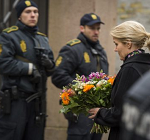I was the Indian Ambassador in Copenhagen from 1996 to 1999, and was therefore especially saddened by the recent violence in the city—one person was killed at a public event on February 14 to celebrate the freedom of expression, and another one died in an attack the next day outside the Great Synagogue of Copenhagen.
While I lived there—a city of dozens of art museums, summer jazz festivals, and awfully cold winters–overlooking the Øresund towards Sweden, an occasional violent incident flowed out of crime rather than politics or terrorism. But times have changed.
The Copenhagen attacks were preceded by similar but more lethal attacks on the staff of French satirical magazine Charlie Hebdo, and a kosher deli, both in Paris, a month earlier.
The two sets of events stem from a common factor—the caricaturing of Prophet Muhammad, deeply revered in Islam. This was done by Charlie Hebdo (as well as by the Danish daily Jylland-Posten in 2005), and the right to do so was a topic of discussion at the Copenhagen event.
But why is this happening in Denmark? The popular image of the country is constituted by its trademark Lego toys, Tivoli entertainment gardens, Maersk shipping, and Novo Nordisk pharmaceuticals. Below the surface, is this idyllic image congruent with a more complex reality?
Scandinavian countries—Denmark, Norway, Sweden, and Finland—are rightly admired for their successful pursuit of a healthy balance between capitalism and a caring welfare state. But these achievements have also led to a high degree of self-satisfaction, as a result of which economic success sometimes gets projected as moral superiority. I recall Olof Palme, the popular prime minister of Sweden, often referring to his country as a “moral superpower” in the 1980s.
Among Scandinavians, Danes in particular are self-satisfied enough to top happiness polls regularly—as they did in the 2013 World Happiness Report, followed by Norway at second place and Sweden at fifth.
But simultaneously, right-wing parties are on the rise in these countries since the early 1990s. In the European Parliament election in 2014, the Dansk Folkeparti (Danish People’s Party, DPP), with 26.6% of the votes, emerged as the largest party in Denmark, bettering even the success of Marine Le Pen’s Front National in France and the United Kingdom Independence Party.
The growing popularity of xenophobic anti-immigrant right-wing parties such as the Perussuomalaiset (Finns Party), the Norwegian Fremskrittspartiet (Progress Party) and the Danish DPP is at odds with the liberal self-image of the Scandinavians.
In these societies, the anti-immigrant platforms conflate with Islamophobia because many of the non-European immigrants are of North African and Arab origin. This combines racism with religious prejudice. In Stockholm, for example, in 2012, citizens from the Muslim community protested in order to highlight their anguish at discrimination and unemployment.
An especially ugly manifestation of the anti-Muslim malaise was seen in 2011 when the self-proclaimed Norwegian Islamophobe, Anders Breivik, massacred 77 people—including 69 at a youth camp organised by the social-democratic Labour Party—to “save”, he said, Norway and western Europe from a “Muslim takeover.”
Meanwhile, Scandinavians, who had welcomed refugees from disturbed Muslim countries such as Somalia and Iran in the 1970s and 1980s, continue to perceive themselves as tolerant and liberal, even though they now have extremely strict immigration policies.
A sad fact that I noted when I was the Ambassador in Denmark in the late 1990s was that although Muslims constituted 4% of the country’s 5.5 million people, they were unable to buy land to build a cemetery because no neighbourhood wanted large numbers of Muslim visitors. It was only in 2006 that they finally received land in Brøndby, near Copenhagen. It is also incredible that for a community of around 250,000 people, there are only two purpose-built mosques in the entire country.
It is also noteworthy that western societies behave as if their right to free expression is anchored in the right to mock Islam, but not Judaism—doing so in countries such as Germany and France is a criminal offence. This is hardly surprising, given the horrors of the Holocaust and the history of an allegedly anti-Jewish Catholic Church.
However, Scandinavia is largely Lutheran and was not involved in the kind of pogroms that were regular in Russia and Central Europe. And yet, Scandinavian countries—which have rightly campaigned against anti-Semitic, homophobic, racist, and sexist representations in the media and art—must urgently examine why their sense of themselves as free thinkers is located in the right to primarily offend only one religious group.
Even as Denmark asserts its right to an “open, free and peaceful democracy”—as Prime Minister Helle Thorning-Schmidt said after the Copenhagen shootings—200 Danes participated in January in their country’s first protest by the Patriotic Europeans Against the Islamisation of the West, Germany’s anti-Islam group. As in Germany, in Demark too anti-Islamic sentiment is likely to proliferate.
Ambassador Neelam Deo is Co-founder and Director of Gateway House. She has been the Indian Ambassador to Denmark and Ivory Coast with concurrent accreditation to several West African countries.
This blog was exclusively written for Gateway House: Indian Council on Global Relations. You can read more exclusive content here.
For interview requests with the author, or for permission to republish, please contact outreach@gatewayhouse.
© Copyright 2015 Gateway House: Indian Council on Global Relations. All rights reserved. Any unauthorized copying or reproduction is strictly prohibited.


